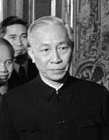Le Duc Tho
| Lê Đức Thọ | |
|---|---|
 |
|
| Head of the Central Organizing Commission of the Communist Party of Vietnam | |
|
In office 1976–1980 |
|
| Preceded by | Lê Văn Lương |
| Succeeded by | Nguyễn Đức Tâm |
|
In office 1956–1973 |
|
| Preceded by | Lê Văn Lương |
| Succeeded by | Lê Văn Lương |
| Member of the Secretariat | |
|
In office 1960 – 10 December 1986 |
|
| Member of the Politburo | |
|
In office 1955 – 18 December 1986 |
|
| Personal details | |
| Born |
Phan Đình Khải 14 October 1911 Nam Định Province, French Indochina |
| Died | 13 October 1990 (aged 78) Hanoi, Socialist Republic of Vietnam |
| Nationality | Vietnamese |
| Political party | Communist Party of Vietnam |
Lê Đức Thọ (Vietnamese: [lē ɗɨ̌k tʰɔ̂ˀ]; 14 October 1911 – 13 October 1990), born Phan Đình Khải in Hà Nam Province, was a Vietnamese revolutionary, general, diplomat, and politician. He was awarded the Nobel Peace Prize jointly with United States Secretary of State Henry Kissinger in 1973, but he declined it.
In 1930, Thọ helped found the Indochinese Communist Party. French colonial authorities imprisoned him from 1930 to 1936 and again from 1939 to 1944. After his release in 1945, he helped lead the Viet Minh, the Vietnamese independence movement, against the French, until the Geneva Accords were signed in 1954. In 1948, he was in South Vietnam as Deputy Secretary, Head of the Organization Department of Cochinchina Committee Party. He then joined the Lao Dong Politburo of the Vietnam Workers' Party in 1955, now the Communist Party of Vietnam. Thọ oversaw the Communist insurgency that began in 1956 against the South Vietnamese government. In 1963 Thọ supported the purges of the Party surrounding Resolution 9.
From 1978 to 1982 Thọ was named by Hanoi to act as chief advisor to the Kampuchean United Front for National Salvation (FUNSK) and later to the nascent People's Republic of Kampuchea. Lê Đức Thọ's mission was to ensure that Khmer nationalism would not override Vietnam's interests in Cambodia after the Khmer Rouge was overthrown.
...
Wikipedia
